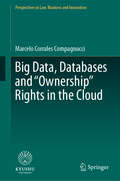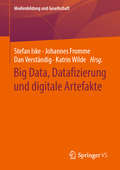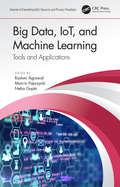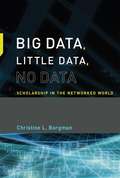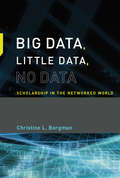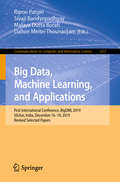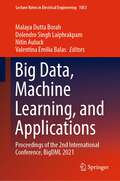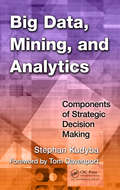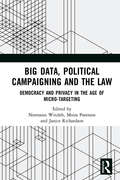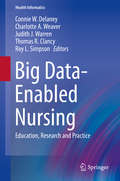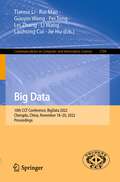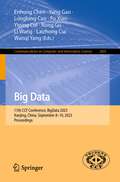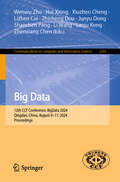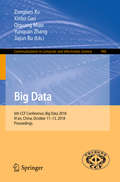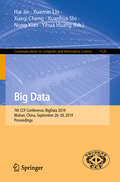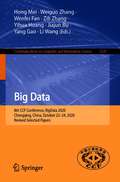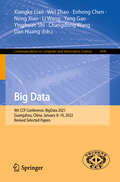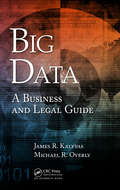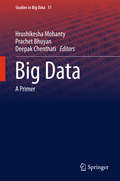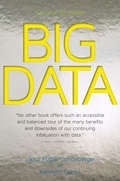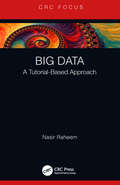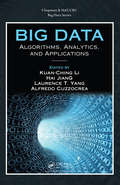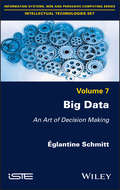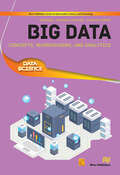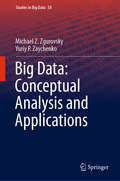- Table View
- List View
Big Data, Databases and "Ownership" Rights in the Cloud (Perspectives in Law, Business and Innovation)
by Marcelo Corrales CompagnucciTwo of the most important developments of this new century are the emergence of cloud computing and big data. However, the uncertainties surrounding the failure of cloud service providers to clearly assert ownership rights over data and databases during cloud computing transactions and big data services have been perceived as imposing legal risks and transaction costs. This lack of clear ownership rights is also seen as slowing down the capacity of the Internet market to thrive. Click-through agreements drafted on a take-it-or-leave-it basis govern the current state of the art, and they do not allow much room for negotiation. The novel contribution of this book proffers a new contractual model advocating the extension of the negotiation capabilities of cloud customers, thus enabling an automated and machine-readable framework, orchestrated by a cloud broker.Cloud computing and big data are constantly evolving and transforming into new paradigms where cloud brokers are predicted to play a vital role as innovation intermediaries adding extra value to the entire life cycle. This evolution will alleviate the legal uncertainties in society by means of embedding legal requirements in the user interface and related computer systems or its code. This book situates the theories of law and economics and behavioral law and economics in the context of cloud computing and takes database rights and ownership rights of data as prime examples to represent the problem of collecting, outsourcing, and sharing data and databases on a global scale. It does this by highlighting the legal constraints concerning ownership rights of data and databases and proposes finding a solution outside the boundaries and limitations of the law. By allowing cloud brokers to establish themselves in the market as entities coordinating and actively engaging in the negotiation of service-level agreements (SLAs), individual customers as well as small and medium-sized enterprises could efficiently and effortlessly choose a cloud provider that best suits their needs. This approach, which the author calls “plan-like architectures,” endeavors to create a more trustworthy cloud computing environment and to yield radical new results for the development of the cloud computing and big data markets.
Big Data, Datafizierung und digitale Artefakte (Medienbildung und Gesellschaft #42)
by Johannes Fromme Dan Verständig Stefan Iske Katrin WildeDer Band fokussiert Entwicklungen und Problemstellungen rund um das Verhältnis des Menschen zu Daten und Zahlen sowie die daran geknüpften Implikationen für Medien, Bildung und Gesellschaft. Ausgangspunkte bilden hierbei auf der einen Seite Big Data und Tendenzen der Datafizierung sozialer Prozesse, auf der anderen Seite Transformationen des Ästhetischen im Hinblick auf kreativ-ästhetische Praktiken. Der Band versammelt dabei unterschiedliche theoretische Positionen, die sich gemeinsam an zentralen Fragen der Medienbildung und kulturellen Bildung im digitalen Zeitalter orientieren.
Big Data, IoT, and Machine Learning: Tools and Applications (Internet of Everything (IoE))
by Rashmi Agrawal, Marcin Paprzycki, Neha GuptaThe idea behind this book is to simplify the journey of aspiring readers and researchers to understand Big Data, IoT and Machine Learning. It also includes various real-time/offline applications and case studies in the fields of engineering, computer science, information security and cloud computing using modern tools. This book consists of two sections: Section I contains the topics related to Applications of Machine Learning, and Section II addresses issues about Big Data, the Cloud and the Internet of Things. This brings all the related technologies into a single source so that undergraduate and postgraduate students, researchers, academicians and people in industry can easily understand them. Features Addresses the complete data science technologies workflow Explores basic and high-level concepts and services as a manual for those in the industry and at the same time can help beginners to understand both basic and advanced aspects of machine learning Covers data processing and security solutions in IoT and Big Data applications Offers adaptive, robust, scalable and reliable applications to develop solutions for day-to-day problems Presents security issues and data migration techniques of NoSQL databases
Big Data, Little Data, No Data
by Christine L. Borgman"Big Data" is on the covers of Science, Nature, the Economist, and Wired magazines, on the front pages of the Wall Street Journal and the New York Times. But despite the media hyperbole, as Christine Borgman points out in this examination of data and scholarly research, having the right data is usually better than having more data; little data can be just as valuable as big data. In many cases, there are no data -- because relevant data don't exist, cannot be found, or are not available. Moreover, data sharing is difficult, incentives to do so are minimal, and data practices vary widely across disciplines.Borgman, an often-cited authority on scholarly communication, argues that data have no value or meaning in isolation; they exist within a knowledge infrastructure -- an ecology of people, practices, technologies, institutions, material objects, and relationships. After laying out the premises of her investigation -- six "provocations" meant to inspire discussion about the uses of data in scholarship -- Borgman offers case studies of data practices in the sciences, the social sciences, and the humanities, and then considers the implications of her findings for scholarly practice and research policy. To manage and exploit data over the long term, Borgman argues, requires massive investment in knowledge infrastructures; at stake is the future of scholarship.
Big Data, Little Data, No Data: Scholarship in the Networked World (The\mit Press Ser.)
by Christine L. BorgmanAn examination of the uses of data within a changing knowledge infrastructure, offering analysis and case studies from the sciences, social sciences, and humanities.“Big Data” is on the covers of Science, Nature, the Economist, and Wired magazines, on the front pages of the Wall Street Journal and the New York Times. But despite the media hyperbole, as Christine Borgman points out in this examination of data and scholarly research, having the right data is usually better than having more data; little data can be just as valuable as big data. In many cases, there are no data—because relevant data don't exist, cannot be found, or are not available. Moreover, data sharing is difficult, incentives to do so are minimal, and data practices vary widely across disciplines.Borgman, an often-cited authority on scholarly communication, argues that data have no value or meaning in isolation; they exist within a knowledge infrastructure—an ecology of people, practices, technologies, institutions, material objects, and relationships. After laying out the premises of her investigation—six “provocations” meant to inspire discussion about the uses of data in scholarship—Borgman offers case studies of data practices in the sciences, the social sciences, and the humanities, and then considers the implications of her findings for scholarly practice and research policy. To manage and exploit data over the long term, Borgman argues, requires massive investment in knowledge infrastructures; at stake is the future of scholarship.
Big Data, Machine Learning, and Applications: First International Conference, BigDML 2019, Silchar, India, December 16–19, 2019, Revised Selected Papers (Communications in Computer and Information Science #1317)
by Sivaji Bandyopadhyay Ripon Patgiri Malaya Dutta Borah Dalton Meitei ThounaojamThis book constitutes refereed proceedings of the First International First International Conference on Big Data, Machine Learning, and Applications, BigDML 2019, held in Silchar, India, in December.The 6 full papers and 3 short papers were carefully reviewed and selected from 152 submissions. The papers present research on such topics as computing methodology; machine learning; artificial intelligence; information systems; security and privacy.
Big Data, Machine Learning, and Applications: Proceedings of the 2nd International Conference, BigDML 2021 (Lecture Notes in Electrical Engineering #1053)
by Valentina Emilia Balas Nitin Auluck Malaya Dutta Borah Dolendro Singh LaiphrakpamThis book constitutes refereed proceedings of the Second International Conference on Big Data, Machine Learning, and Applications, BigDML 2021. The volume focuses on topics such as computing methodology; machine learning; artificial intelligence; information systems; security and privacy. This volume will benefit research scholars, academicians, and industrial people who work on data storage and machine learning.
Big Data, Mining, and Analytics: Components of Strategic Decision Making
by Stephan KudybaThere is an ongoing data explosion transpiring that will make previous creations, collections, and storage of data look trivial. Big Data, Mining, and Analytics: Components of Strategic Decision Making ties together big data, data mining, and analytics to explain how readers can leverage them to extract valuable insights from their data. Facilitati
Big Data, Political Campaigning and the Law: Democracy and Privacy in the Age of Micro-Targeting
by Normann Witzleb Moira Paterson Janice RichardsonIn this multidisciplinary book, experts from around the globe examine how data-driven political campaigning works, what challenges it poses for personal privacy and democracy, and how emerging practices should be regulated. The rise of big data analytics in the political process has triggered official investigations in many countries around the world, and become the subject of broad and intense debate. Political parties increasingly rely on data analytics to profile the electorate and to target specific voter groups with individualised messages based on their demographic attributes. Political micro-targeting has become a major factor in modern campaigning, because of its potential to influence opinions, to mobilise supporters and to get out votes. The book explores the legal, philosophical and political dimensions of big data analytics in the electoral process. It demonstrates that the unregulated use of big personal data for political purposes not only infringes voters’ privacy rights, but also has the potential to jeopardise the future of the democratic process, and proposes reforms to address the key regulatory and ethical questions arising from the mining, use and storage of massive amounts of voter data. Providing an interdisciplinary assessment of the use and regulation of big data in the political process, this book will appeal to scholars from law, political science, political philosophy and media studies, policy makers and anyone who cares about democracy in the age of data-driven political campaigning.
Big Data-Enabled Nursing: Education, Research and Practice (Health Informatics)
by Charlotte A. Weaver Connie W. Delaney Judith J. Warren Thomas R. Clancy Roy L. SimpsonHistorically, nursing, in all of its missions of research/scholarship, education and practice, has not had access to large patient databases. Nursing consequently adopted qualitative methodologies with small sample sizes, clinical trials and lab research. Historically, large data methods were limited to traditional biostatical analyses. In the United States, large payer data has been amassed and structures/organizations have been created to welcome scientists to explore these large data to advance knowledge discovery. Health systems electronic health records (EHRs) have now matured to generate massive databases with longitudinal trending. This text reflects how the learning health system infrastructure is maturing, and being advanced by health information exchanges (HIEs) with multiple organizations blending their data, or enabling distributed computing. It educates the readers on the evolution of knowledge discovery methods that span qualitative as well as quantitative data mining, including the expanse of data visualization capacities, are enabling sophisticated discovery. New opportunities for nursing and call for new skills in research methodologies are being further enabled by new partnerships spanning all sectors.
Big Data: 10th CCF Conference, BigData 2022, Chengdu, China, November 18–20, 2022, Proceedings (Communications in Computer and Information Science #1709)
by Lei Zhang Li Wang Tianrui Li Guoyin Wang Jie Hu Rui Mao Laizhong Cui Fei TengThis book constitutes the refereed proceedings of the 10th CCF Conference on BigData 2022, which took place in Chengdu, China, in November 2022. The 8 full papers presented in this volume were carefully reviewed and selected from 28 submissions. The topics of accepted papers include theories and methods of data science, algorithms and applications of big data.
Big Data: 11th CCF Conference, BigData 2023, Nanjing, China, September 8–10, 2023, Proceedings (Communications in Computer and Information Science #2005)
by Longbing Cao Li Wang Yang Gao Fu Xiao Laizhong Cui Enhong Chen Yiping Cui Rong Gu Wanqi YangThis book constitutes the refereed proceedings of the 11th CCF Conference on BigData 2023, which took place in Nanjing, China, in September 2023. The 14 full papers presented in this volume were carefully reviewed and selected from 69 submissions. The topics of accepted papers include theories and methods of data science, algorithms and applications of big data.
Big Data: 12th CCF Conference, BigData 2024, Qingdao, China, August 9–11, 2024, Proceedings (Communications in Computer and Information Science #2301)
by Hui Xiong Li Wang Wenwu Zhu Zhicheng Dou Xiuzhen Cheng Zhenxiang Chen Lizhen Cui Junyu Dong Shanchen Pang Lanju Kong“This book constitutes the refereed proceedings of the 12th CCF Conference on BigData 2024, which took place in Qingdao, China, in August 2024” to “This book constitutes the refereed proceedings of the 12th CCF Conference on BigData 2024, which took place in Qingdao, China, during 9-11 August, 2024. The 26 full papers presented in this volume were carefully reviewed and selected from 219 submissions. The topics of accepted papers include Big data, Data Science, System Architecture and Infrastructure, Storage Management, Parallel Computing, Analysis Mining and Intelligent Computing, Collection and Preprocessing, Governance.
Big Data: 6th CCF Conference, Big Data 2018, Xi'an, China, October 11-13, 2018, Proceedings (Communications in Computer and Information Science #945)
by Xinbo Gao Qiguang Miao Zongben Xu Yunquan Zhang Jiajun BuThis volume constitutes the proceedings of the 6th CCF Conference, Big Data 2018, held in Xi'an, China, in October 2018. The 32 revised full papers presented in this volume were carefully reviewed and selected from 880 submissions. The papers are organized in topical sections on natural language processing and text mining; big data analytics and smart computing; big data applications; the application of big data in machine learning; social networks and recommendation systems; parallel computing and storage of big data; data quality control and data governance; big data system and management.
Big Data: 7th CCF Conference, BigData 2019, Wuhan, China, September 26–28, 2019, Proceedings (Communications in Computer and Information Science #1120)
by Hai Jin Xuemin Lin Xuanhua Shi Xueqi Cheng Nong Xiao Yihua HuangThis book constitutes the proceedings of the 7th CCF Conference on Big Data, BigData 2019, held in Wuhan, China, in October 2019.The 30 full papers presented in this volume were carefully reviewed and selected from 324 submissions. They were organized in topical sections as follows: big data modelling and methodology; big data support and architecture; big data processing; big data analysis; and big data application.
Big Data: 8th CCF Conference, BigData 2020, Chongqing, China, October 22–24, 2020, Revised Selected Papers (Communications in Computer and Information Science #1320)
by Li Wang Yang Gao Zili Zhang Hong Mei Jiajun Bu Yihua Huang Weiguo Zhang Wenfei FanThis book constitutes the proceedings of the 8th CCF Conference on Big Data, BigData 2020, held in Chongqing, China, in October 2020.The 16 full papers presented in this volume were carefully reviewed and selected from 65 submissions. They present recent research on theoretical and technical aspects on big data, as well as on digital economy demands in big data applications.
Big Data: 9th CCF Conference, BigData 2021, Guangzhou, China, January 8–10, 2022, Revised Selected Papers (Communications in Computer and Information Science #1496)
by Li Wang Yang Gao Wei Zhao Yinghuan Shi Nong Xiao Dan Huang Xiangke Liao Enhong Chen Changdong WangThis book constitutes the proceedings of the 9th CCF Conference on Big Data, BigData 2021, held in Guangzhou, China, in January 2022. Due to the COVID-19 pandemic BigData 2021 was postponed to 2022. The 21 full papers presented in this volume were carefully reviewed and selected from 66 submissions. They present recent research on theoretical and technical aspects on big data, as well as on digital economy demands in big data applications.
Big Data: A Business and Legal Guide
by James R. Kalyvas Michael R. OverlyBig Data: A Business and Legal Guide supplies a clear understanding of the interrelationships between Big Data, the new business insights it reveals, and the laws, regulations, and contracting practices that impact the use of the insights and the data. Providing business executives and lawyers (in-house and in private practice) with an accessible p
Big Data: A Primer (Studies in Big Data #11)
by Hrushikesha Mohanty Prachet Bhuyan Deepak ChenthatiThis book is a collection of chapters written by experts on various aspects of big data. The book aims to explain what big data is and how it is stored and used. The book starts from the fundamentals and builds up from there. It is intended to serve as a review of the state-of-the-practice in the field of big data handling. The traditional framework of relational databases can no longer provide appropriate solutions for handling big data and making it available and useful to users scattered around the globe. The study of big data covers a wide range of issues including management of heterogeneous data, big data frameworks, change management, finding patterns in data usage and evolution, data as a service, service-generated data, service management, privacy and security. All of these aspects are touched upon in this book. It also discusses big data applications in different domains. The book will prove useful to students, researchers, and practicing database and networking engineers.
Big Data: A Revolution That Will Transform How We Live, Work, and Think
by Viktor Mayer-Schönberger Kenneth Cukier<P>A revelatory exploration of the hottest trend in technology and the dramatic impact it will have on the economy, science, and society at large.Which paint color is most likely to tell you that a used car is in good shape? How can officials identify the most dangerous New York City manholes before they explode? And how did Google searches predict the spread of the H1N1 flu outbreak? The key to answering these questions, and many more, is big data. <P> “Big data” refers to our burgeoning ability to crunch vast collections of information, analyze it instantly, and draw sometimes profoundly surprising conclusions from it. This emerging science can translate myriad phenomena—from the price of airline tickets to the text of millions of books—into searchable form, and uses our increasing computing power to unearth epiphanies that we never could have seen before. <P> A revolution on par with the Internet or perhaps even the printing press, big data will change the way we think about business, health, politics, education, and innovation in the years to come. It also poses fresh threats, from the inevitable end of privacy as we know it to the prospect of being penalized for things we haven’t even done yet, based on big data’s ability to predict our future behavior.In this brilliantly clear, often surprising work, two leading experts explain what big data is, how it will change our lives, and what we can do to protect ourselves from its hazards. Big Data is the first big book about the next big thing.
Big Data: A Tutorial-Based Approach
by Nasir RaheemBig Data: A Tutorial-Based Approach explores the tools and techniques used to bring about the marriage of structured and unstructured data. It focuses on Hadoop Distributed Storage and MapReduce Processing by implementing (i) Tools and Techniques of Hadoop Eco System, (ii) Hadoop Distributed File System Infrastructure, and (iii) efficient MapReduce processing. The book includes Use Cases and Tutorials to provide an integrated approach that answers the ‘What’, ‘How’, and ‘Why’ of Big Data. Features Identifies the primary drivers of Big Data Walks readers through the theory, methods and technology of Big Data Explains how to handle the 4 V’s of Big Data in order to extract value for better business decision making Shows how and why data connectors are critical and necessary for Agile text analytics Includes in-depth tutorials to perform necessary set-ups, installation, configuration and execution of important tasks Explains the command line as well as GUI interface to a powerful data exchange tool between Hadoop and legacy r-dbms databases
Big Data: Algorithms, Analytics, and Applications (Chapman And Hall/crc Big Data Ser.)
by Hai Jiang Alfredo Cuzzocrea Laurence T. Yang Kuan-Ching LiAs today's organizations are capturing exponentially larger amounts of data than ever, now is the time for organizations to rethink how they digest that data. Through advanced algorithms and analytics techniques, organizations can harness this data, discover hidden patterns, and use the newly acquired knowledge to achieve competitive advantages.Pre
Big Data: An Art of Decision Making
by Eglantine SchmittManipulating and processing masses of digital data is never a purely technical activity. It requires an interpretative and exploratory outlook – already well known in the social sciences and the humanities – to convey intelligible results from data analysis algorithms and create new knowledge. Big Data is based on an inquiry of several years within Proxem, a software publisher specializing in big data processing. The book examines how data scientists explore, interpret and visualize our digital traces to make sense of them, and to produce new knowledge. Grounded in epistemology and science and technology studies, Big Data offers a reflection on data in general, and on how they help us to better understand reality and decide on our daily actions.
Big Data: Concepts, Warehousing, and Analytics
by Carlos Costa Maribel Yasmina SantosBig Data is a concept of major relevance in today’s world, sometimes highlighted as a key asset for productivity growth, innovation, and customer relationship, whose popularity has increased considerably during the last years. Areas like smart cities, manufacturing, retail, finance, software development, environment, digital media, among others, can benefit from the collection, storage, processing, and analysis of Big Data, leveraging unprecedented data-driven workflows and considerably improved decision-making processes.The concept of a Big Data Warehouse (BDW) is emerging as either an augmentation or a replacement of the traditional Data Warehouse (DW), a concept that has a long history as one of the most valuable enterprise data assets. Nevertheless, research in Big Data Warehousing is still in its infancy, lacking an integrated and validated approach for designing and implementing both the logical layer (data models, data flows, and interoperability between components) and the physical layer (technological infrastructure) of these complex systems. This book addresses models and methods for designing and implementing Big Data Systems to support mixed and complex decision processes, giving special attention to BDWs as a way of efficiently storing and processing batch or streaming data for structured or semi-structured analytical problems.
Big Data: Conceptual Analysis and Applications (Studies in Big Data #58)
by Yuriy P. Zaychenko Michael Z. ZgurovskyThe book is devoted to the analysis of big data in order to extract from these data hidden patterns necessary for making decisions about the rational behavior of complex systems with the different nature that generate this data. To solve these problems, a group of new methods and tools is used, based on the self-organization of computational processes, the use of crisp and fuzzy cluster analysis methods, hybrid neural-fuzzy networks, and others. The book solves various practical problems. In particular, for the tasks of 3D image recognition and automatic speech recognition large-scale neural networks with applications for Deep Learning systems were used. Application of hybrid neuro-fuzzy networks for analyzing stock markets was presented. The analysis of big historical, economic and physical data revealed the hidden Fibonacci pattern about the course of systemic world conflicts and their connection with the Kondratieff big economic cycles and the Schwabe–Wolf solar activity cycles. The book is useful for system analysts and practitioners working with complex systems in various spheres of human activity.
